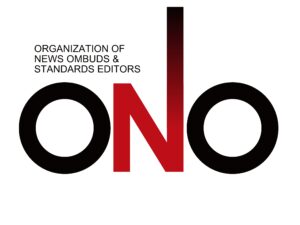A word from the board
Dear colleagues, The role of ONO members is usually concerned with the decisions that news organisations make about the way they report and the reaction of audiences to those decisions. It’s a tough job and getting tougher but it is still a privilege in a world where a free press is shrinking. In this newsletter we report on the situation in Argentina where the office of Defensoría del Público, the broadcasting ombudsman, faces further interventions and intimidation from the authoritarian regime of President Javier Milei. Against this background we are pleased to announce that the board has decided to make Miriam Lewin, who recently finished her term as the Defensoría, an honorary member of ONO. This month we are also seeking the views of ONO members on the use of gagging orders to prevent public officials and others from speaking to reporters. And if that focuses on the concern that certain groups are not allowed to speak what do we think about a space in which some people say too much? When Twitter was launched it was seen as having extraordinary potential to be the world’s forum, a forum where all had equal access to discuss ideas. Now it has become X, a “cesspool”, according to one board member. Should ONO still be on that platform?
Margo Smit, president
Jack Nagler, vice-president
Elisabeth Ribbans, treasurer
Chris Elliott, executive director
Do reporters have an ethical duty to fight gags on public servants?

Kathryn Foxhall is a veteran health reporter and Freedom of Information Advocate for the US Society of Professional Journalists. She recently emailed ONO to discover what ombuds think about the increasing use of “gagging orders” to prevent public officials from talking to journalists. She wrote :
“I work on the issue of gag rules in public and private institutions that ban employees or others from speaking to reporters or ban such contact without notification of authorities.
“I’d like to see discussion among ombudsmen about the lack of opposition to these gag rules from news organizations. The rules hide much from the public and the press. I’d like to hear how not opposing them can be ethical journalism.
“In the U.S. these restrictions have become very pervasive with little public discussion. In April investigative reporter Brittany Hailer won a favorable settlement, with strong First Amendment language, supporting employees’ and contractors’ right to speak. Hailer had filed a legal action last August against the Allegheny County Jail in Pittsburgh, Pennsylvania. The facility had prohibited employees and contractors from speaking to reporters even as there was an alleged high rate of inmate deaths.
“The settlement was a breakthrough for the Society of Professional Journalists which helped originate the work. The Yale Law School Media Freedom and Information Access Clinic and the Reporters Committee for Freedom of the Press filed the suit on behalf of Hailer whose reporting was funded in part by The Pulitzer Center… As a veteran health reporter who saw these restrictions arise in U.S. federal health agencies, I have no doubt they were a key factor in the dysfunction that exacerbated the pandemic…
May we hear from you on the questions of whether these restrictions can exist without keeping information from the public and whether it can be ethical journalism not to openly oppose such restrictions on speech?”
Other useful links to resources posted by Kathryn are :
- PR Office Censorship: Resources on The Growing Gag Rules and “Censorship by PIO” Over A Decade
- PR Office Censorship: From Walking Agency Halls to Being Denied Contact: How the Controls Came
Down on FDA Reporter)
Kathryn also wrote:
“Glen Nowak, a former CDC [Centers for disease control and prevention] communications director with many years at the agency, has said that presidential administrations have handed down restraints on what may be said and who reporters may talk to; that the rules have tightened with every president since Reagan; and that they are explicitly political. It’s what many journalists suspected”.
In the UK such “gagging orders” involve a non-disclosure agreement (NDA), which are often used to prevent employees – often women in cases where sexual harassment or assault is alleged at work – speaking out after a settlement when they leave the company.
Do members think journalists have an ethical obligation to fight them where they find them? Please email Kathryn via ONO.
Technology update and a question
ONO’s website
Jeff Brown and his team at Honeytree Technologies are due to start rebuilding the website in October following its migration to their company’s platform. As members and others can see, the migration was not without its problems, which only underline the need to refurbish and refresh. There are six phases of the upgrade. The first – backup and initial review – has been completed. All ideas will now be fed into the next stage, which is to assess current and future needs.
The website working party – Pierre, Chris and Jack – believe that the website is primarily for our members and that it should be fast and look as good on a smartphone as it does on a large screen. However, we would also like to make it welcoming to people interested in what ONO and its members do; there must be a public side and the members only section. How should they be displayed?
It is important that we have a prominent and effective donate and subscriptions button. There should be no impediment to members paying their dues and any casual donor must not feel frustrated because they can’t make the button work.
As Pierre points out, the architecture of the site must be rethought. A lot of content is wandering without a cause, attached to not much in particular, neither making sense nor value. We need some basic housekeeping that could be achieved in an archive for members only. We certainly do not want to erase the past before having had a good think about what is still relevant and what is not.
Margo believes that “ONO being the small organization with hard working members that it is, we don’t truly have the capacity to constantly update and be a true player on the advocacy level. We would do better to make a website that provides our members with the best and most current we can offer them now, and to have a small level of good but basic information that doesn’t need updating much for already interested people looking for more info, most likely Ombuds-to-be colleagues in news organizations”.
There is still time if colleagues wish to add any ideas to the mix.
Should ONO quit X/Twitter?
While ONO considers the future of the website we are also looking at ONO’s social media. If X had moderation problems when it was still Twitter, now that it has become X it has become a forum for racist and extremist language of all kinds. The ONO board thinks we should quit the platform – what do you think?
Argentina: the government moves against the Defensoría del Público
Luciana Rabinovich, who worked with Miriam in the office of the Defensoría del Público, Argentina’s broadcasting ombudsman, has emailed updates on the latest government moves against the Defensoría:
“Firstly, the Public Defender’s Office has finally been intervened. In July, an internal auditor was appointed to review the organization’s operations over the past 12 years. Meanwhile, the organization’s general activities have practically come to a halt. We still don’t know what will happen, but suspicions exist regarding the organization’s short-term closure.
“The day-to-day situation is challenging and exhausting… We are worried about the jobs of our colleagues at the Public Defender’s Office and their mental health, as the situation is very stressful”.
Miriam said she was honoured and deeply moved to be to accept an offer from the board to become an honorary ONO member. In a message, she says of the situation in Argentina:
“The state of freedom of expression is getting worse in Argentina. Audience rights have been jeopardized by government intervention in the organization, and escalating violence and hate speech promoted by officials have led to widespread self-censorship.
“Women journalists, in particular, though not exclusively, have been harassed and accused of being corrupt ‘serial liars’ by the president and ministers. Any criticism is answered by hundreds of government-funded trolls, causing significant emotional harm to independent press workers.
The right to protest has also been suppressed, with even older adults and children beaten and exposed to tear gas by the police in recent weeks.
Thanks once more for all your support”.
Members’ contributions Please refer to the PDF version of the September 2024 Newsletter.
This is your newsletter!
If you want to share your own experiences or have reports all ONO members should know about, find us at newsombudsmenorg@gmail.com and we will include it in ONO’s next newsletter.
Did you know…
…that the ONO Newsletter is also available on the ONO website? It may be a little later going up on the site this month, but it will be there.

